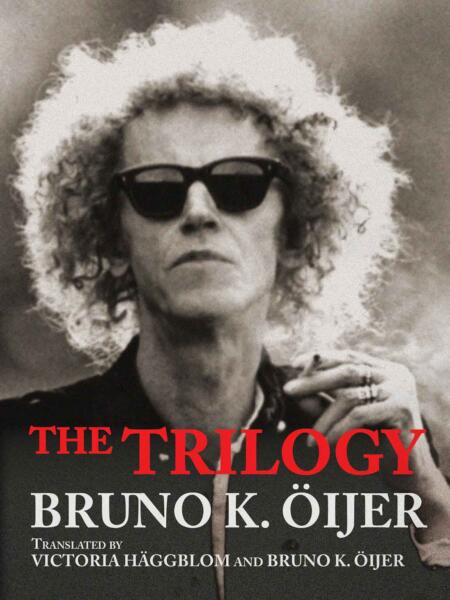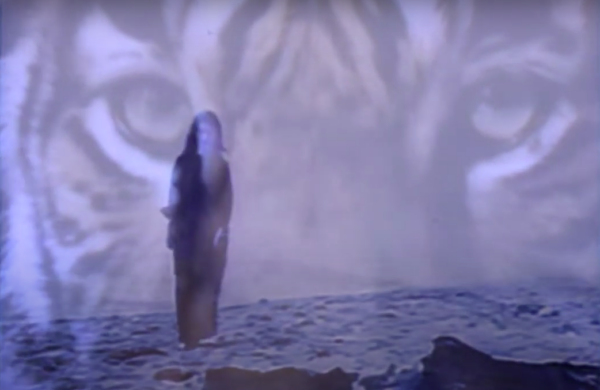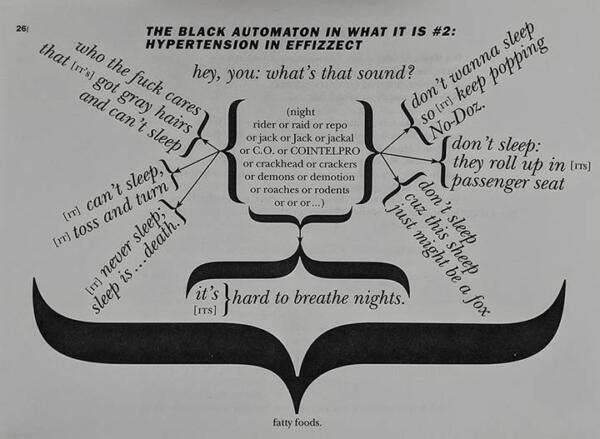
It seems likely, despite the zeal of the back-to-normal and back-to-work crowds, that we might be seeing more online poetry readings in the near and extended future. Soon maybe it won’t feel unusual to say you discovered this writer on zoom or that poet through a live instagram reading series. Still, it seemed strangely distinct in the last month or so to discover Bruno K. Öijer’s performances on youtube before I sat down to read The Trilogy as texts.
The videos feature Öijer’s distinctive physical appearance and easy cigarette cool intercut with eerie karaoke images of a surrealist bent (animals, bad weather). Most indelibly, Öijer delivers his poems with a distinctive voice and rhythm, one that hovers in my mind as I read his poetry.
What makes these performances (or any poetry reading, obviously) engaging and memorable? I don’t know whether I intend to make a distinction between performance and reading, but I do see something unique in Öijer’s work—the performance seems to get at something that both is and isn’t in the text (I almost want to say it isn’t just a reading). Why do Öijer’s performances and written poems seem both separate and yet inflect upon each other in such interesting ways?
At the most strikingly dreamlike moments in Bruno K. Öijer’s The Trilogy, I found it easiest to recall from those videos the deliberate pace and the distinctive breath of emphatic arc placed on certain syllables. In an untitled poem from the first book While The Poison Acts, an already surreal geography gives way to a bewildering sense of time:
the most silent one among the chosen
buried a couple of rings
a buzzard’s feather and two steel name tags
with his children’s fingerprints
on the slope
where evening is 300 times strongerthan on Earth
I hear, in an English approximation of Öijer’s style, a drawing out of the first syllable of “stronger” in the penultimate line and then the long breath of the second syllable leaving the last line “than on Earth” as a kind of quickly delivered afterthought (which the effect of casual revelation). In my reading, I felt such an emphasis on the peculiar measurement of “evening.” There’s nothing cozier than the list of three in literature, so I wasn’t unsettled by what was buried in the previous lines. In fact, much of the uncanny in The Trilogy comes, as it does here, from an unreal sense of time—I recognized the oddness of the list only after stumbling over the question of how to measure the strength of evening.

In the video “the fog of everything” (the title of the third book), there’s a pop accessibility to the phrase “the last to leave every party” and a poetic familiarity to “the world was sick / sick and shut down for a thousand years” (as well as dose of unfortunate contemporary reality). Things only really become unheimlich for the reader with the odd repetition of Hem / home and the revelation of the doubled account of the poem that exists against “a lie that we’ve come home.” The two accounts unsettle the reader’s notions of the poem’s present.
The influence of Dada, Surrealism, and other 20th century avant-garde movements has been noted in criticism and writing on Öijer’s work. In the indelible aspects of his performances, I’m also reminded of performances of visually dynamic work from those movements and many contemporary writers who came after. While it isn’t necessarily difficult to read inverted, distorted, or typographically energetic text, the visual acoustics of poems which feature that kind of inventiveness often make for entertaining performance. For a contemporary example, consider the contortions required of a reader in approaching Douglas Kearney’s The Black Automaton—physically turning and tilting the book or your head, making decisions about orders and categories of polyvocality, tracing arrows with your finger. These are necessarily expressed in any performance of the book. Kearney’s energy at the microphone more than matches the polyvocal traffic of his pages. It’s a pleasure at a reading to see a writer wrestle with the material in more senses than one, and while I think it’s easier to spot when a book has to be turned upside down, there’s something to be said for the poem which draws the voice(s) out of the poet.

It could be that part of Öijer’s voice is drawn out in composition process which performs the uncanny, a making-strange in the making itself. In “TWO,” an associative logic traces a mild admonishment to its most associative ends: “the newborn’s bath water / was carried outside and poured on the road / he would spend all his time there.” It is an easy leap for a dreamer’s psychology from the idiomatic chiding not to throw the baby out with the bathwater to an absurd gothic in which acts such as this cannot be undone. The familiarity of the idiom and its slight distortions (newborn rather than baby, poured rather than thrown) conduct the reader’s experience of the poem as performance. What lasts is the eerie idea of a nursery rhyme infant, an ephemeral creature only real in the instant of the phrase, spending all his time anywhere at all. The poem performs the idiom and brings its strangeness to our attention. What’s striking about both text and performance is in what is simultaneously familiar and not.
My contention is that the performance doesn’t end with the applause nor is it confined to the text on the page, rather that there’s an open distortion channel with the bleeding positions of reader, writer, and performer as only a some of many sources of static buzzing around composition and interpretation. Bruno K. Öijer’s style of reading seems no more or less affected than his poetry itself—maybe both can be seen as performative as in seemingly unnatural but I wonder if that isn’t inherent to the kind of doubling and upending genre performance that these poems are expressing. That the performance and poetry inflect upon and distort each other seems only natural. In our presents and futures of digital engagement where interruptions are part of the package, I wonder what strangenesses and realizations might come of a deeper attention to those distorting channels.
Jace Brittain is a writer, translator, and poet whose work has appeared in Sleepingfish, Destroyer, the Fanzine, and Crag. They received their MFA at the University of Notre Dame. As a PhD student at the University of Utah, they study fiction, illegibility, and writing circling the non-human. They have been the Digital Matters Research Fellow and are currently an editor for the Halophyte Collective in Salt Lake City.